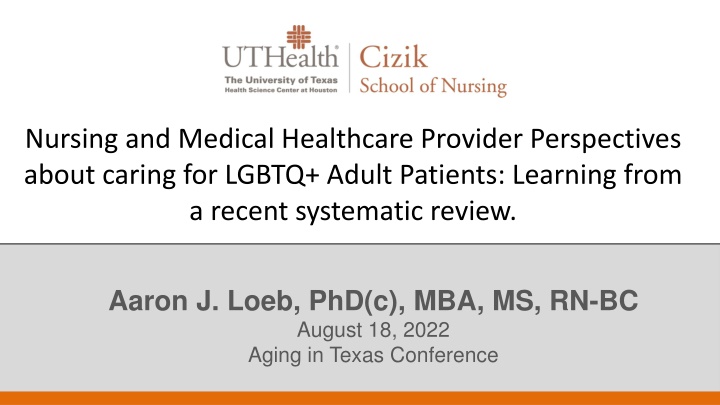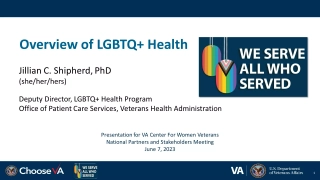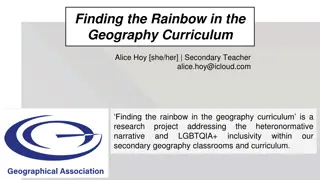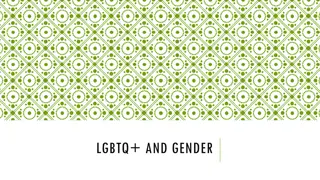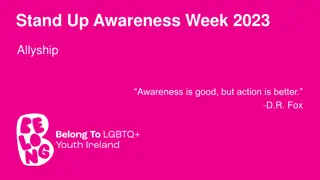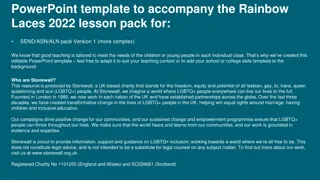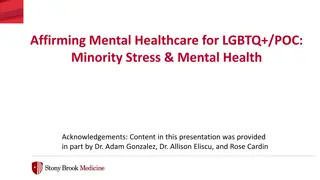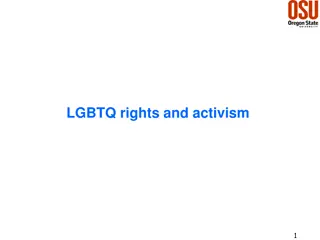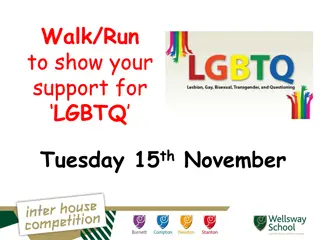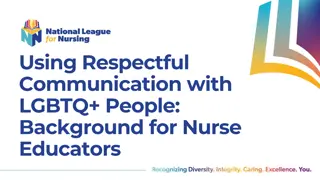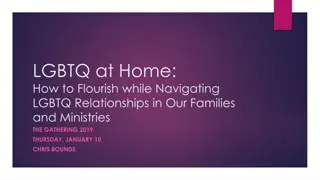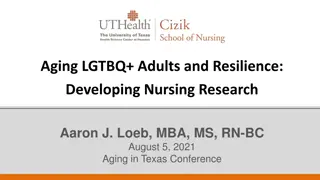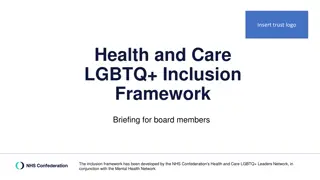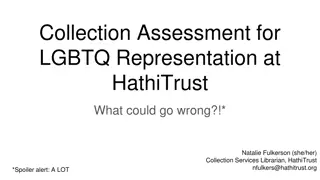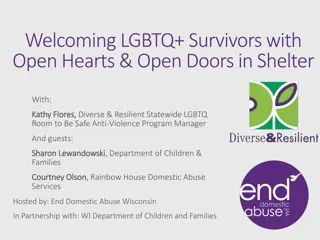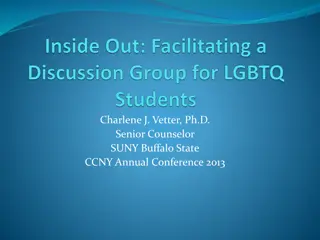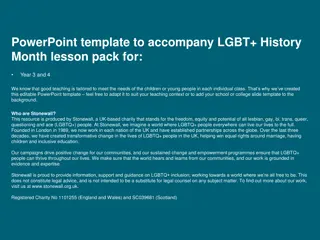Caring for LGBTQ+ Patients: Provider Perspectives
This content explores healthcare provider perspectives on caring for LGBTQ+ adult patients, focusing on barriers, facilitators, cultural competence, and implications. The systematic review sheds light on challenges faced by medical and nursing professionals, emphasizing the importance of cultural competence and awareness in delivering equitable healthcare.
Download Presentation

Please find below an Image/Link to download the presentation.
The content on the website is provided AS IS for your information and personal use only. It may not be sold, licensed, or shared on other websites without obtaining consent from the author.If you encounter any issues during the download, it is possible that the publisher has removed the file from their server.
You are allowed to download the files provided on this website for personal or commercial use, subject to the condition that they are used lawfully. All files are the property of their respective owners.
The content on the website is provided AS IS for your information and personal use only. It may not be sold, licensed, or shared on other websites without obtaining consent from the author.
E N D
Presentation Transcript
Nursing and Medical Healthcare Provider Perspectives about caring for LGBTQ+ Adult Patients: Learning from a recent systematic review. Aaron J. Loeb, PhD(c), MBA, MS, RN-BC August 18, 2022 Aging in Texas Conference
Acknowledgment Dr. Constance Johnson Dr. Cathy Rozmus Dr. Diane Wardell
Agenda Introduction Providers Theoretical Framework Barriers and Facilitators Cultural Competence Implications
Introduction Speaker interest in aging LGBTQ+ population Candidacy exam question Learnings support today Also support dissertation topic
Providers Who are Providers? Although geared toward the medical and nursing professions (systematic review eligibility criteria), audience members who are from other professions are equitable partners! Although medical and nursing healthcare providers have an active role in health outcomes of LGBTQ+ patients, they face interpersonal and organizational challenges in providing equitable healthcare (National Academies of Sciences, 2017).
Cultural Competemility Culturally competent care: awareness of one's cultural worldview, attitudes toward cultural differences, knowledge of different cultural practices and worldviews, and cross-cultural skills. Cultural competence is the willingness to understand and interact with people of different cultures, race, ethnicity, gender, and sexuality (Deering, 2022). Cultural Competemility: A Paradigm Shift in the Cultural Competence versus Cultural Humility Debate Part I (nursingworld.org)
Challenges Organizational Personal Electronic Medical Records Education Resources Belief system Awareness Experiences
Awareness Barriers: Personal religious beliefs Facilitators: awareness of personal bias Opportunities for personal growth Creating positive experiences
Skill Barriers Invalidation of sexual orientation or gender identity Inconsistent healthcare practices Structural challenges Facilitators Positive communication experiences Assessment documentation
Knowledge Barriers Insufficient education Differences in LGBTQ+ population health Healthcare access issues Facilitators Individual knowledge Promotion of education
Encounter Barriers Limited engagement with LGBTQ+ population Overall discomfort and negative beliefs Competing appointment priorities Facilitators Building rapport Nonjudgmental treatment Comfort
Desire Barriers Refusal to be listed as LGBTQ+ provider Competing educational trainings Facilitators Willingness to be listed at LGBTQ+ provider
Discussion Healthcare providers, who are undereducated about LGBTQ+ adult healthcare needs, lack the knowledge, awareness, and skills necessary to provide comprehensive healthcare for LGBTQ+ adults A lack of knowledge may lead to providers being uncertain or unaware of how to address LGBTQ+ adult healthcare needs One consideration about the cause of inadequate provider awareness and knowledge about LGBTQ+ population health is the gaps in nursing and medical student education
Implication for Healthcare Research Conduct additional systematic reviews that include other healthcare roles (e.g., social work, physical and occupational therapy, and pharmacy). Studies that focus on the nursing professional development specialist perspective are needed, as this review had limited data from this professional role.
Implication for Education Incorporating the Assessing LGBTQI+ Health Training (TALHT) instrument when evaluating for gaps and redundancies in curriculum. The Association of American Medical Colleges (2019) recommends broadening education through clinical training beyond lectures and small group formats. 12 tips for teaching about LGBTQ+ population health including distributing respective content across the curriculum and exploring the relevance of sexual identity to health.
The Future Healthcare practice - overcome personal and professional barriers Multifactorial Questions? The end Reference available upon request
